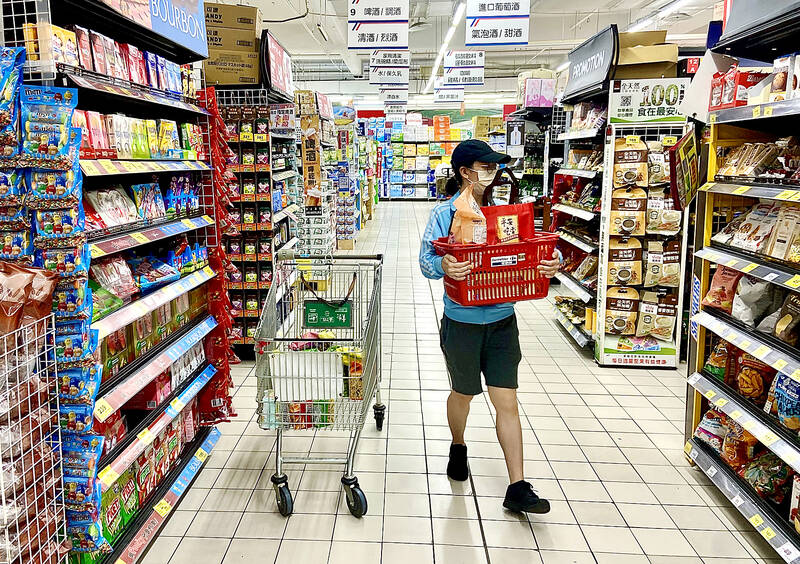The consumer price index (CPI) last month accelerated to an 11-month high of 2.66 percent, as goods and services grew more expensive over the Lunar New Year holiday, the Directorate-General of Budget, Accounting and Statistics (DGBAS) said yesterday.
Stripping out the holiday effect, the headline inflationary reading advanced a milder 2.03 percent, DGBAS official Tsao Chih-hung (曹志弘) said, suggesting that CPI growth would return to the central bank’s 2 percent target this month.
“The weeklong holiday, which fell in January this time around and in February last year, bolstered the CPI gauge by 0.63 percentage points,” the official said.

Photo: CNA
That came after restaurants, hotels and entertainment facilities, as well as travel agencies, barbers, taxis, babysitters and other service providers, raised price tags over the holiday, Tsao said.
Prices should return to normal after the holiday, he added.
Consumer prices rose 0.55 percent from a month earlier and a benign 0.25 percent after seasonal adjustments, the DGBAS report showed.
Core CPI — a more reliable long-term price tracker as it excludes volatile fruit, vegetable and energy prices — expanded 2.26 percent, putting an end to three straight quarters below the 2 percent level.
Prices of miscellaneous item posted the steepest increase of 4.16 percent, as caregivers and hairdressers raised charges by 14.98 percent, in keeping with tradition, the DGBAS said.
For similar reasons, the prices of jewelry and personal accessories climbed 4.97 percent and 7.69 percent respectively, the agency said.
Food costs, the largest chunk, rose 3.72 percent, as vegetable prices gained 20.3 percent, while fruit and cooking oil swelled by 10.46 percent and 5.66 percent respectively, muting a 19.87 percent decline in egg prices, it said.
Education and entertainment costs gained 3.47 percent, it added.
The holiday effect had much to do with these price gains, Tsao said.
However, the holiday season had little to do with the 2.36 and 2.13 increases in shelter and medicine and healthcare fees, the agency said.
CPI growth for elderly people increased 3 percent, higher than the average, which is unfavorable to the nation’s fast-growing group of people who rely on labor pensions alone.
The producer price index — a measure of the price movements of goods from a seller’s perspective — surged 3.87 percent, as prices for agricultural products, electronics and chemical products increase, although base metal product prices dropped, the agency said.

Hon Hai Precision Industry Co (鴻海精密) yesterday said that its research institute has launched its first advanced artificial intelligence (AI) large language model (LLM) using traditional Chinese, with technology assistance from Nvidia Corp. Hon Hai, also known as Foxconn Technology Group (富士康科技集團), said the LLM, FoxBrain, is expected to improve its data analysis capabilities for smart manufacturing, and electric vehicle and smart city development. An LLM is a type of AI trained on vast amounts of text data and uses deep learning techniques, particularly neural networks, to process and generate language. They are essential for building and improving AI-powered servers. Nvidia provided assistance

GREAT SUCCESS: Republican Senator Todd Young expressed surprise at Trump’s comments and said he expects the administration to keep the program running US lawmakers who helped secure billions of dollars in subsidies for domestic semiconductor manufacturing rejected US President Donald Trump’s call to revoke the 2022 CHIPS and Science Act, signaling that any repeal effort in the US Congress would fall short. US Senate Minority Leader Chuck Schumer, who negotiated the law, on Wednesday said that Trump’s demand would fail, while a top Republican proponent, US Senator Todd Young, expressed surprise at the president’s comments and said he expects the administration to keep the program running. The CHIPS Act is “essential for America leading the world in tech, leading the world in AI [artificial

DOMESTIC SUPPLY: The probe comes as Donald Trump has called for the repeal of the US$52.7 billion CHIPS and Science Act, which the US Congress passed in 2022 The Office of the US Trade Representative is to hold a hearing tomorrow into older Chinese-made “legacy” semiconductors that could heap more US tariffs on chips from China that power everyday goods from cars to washing machines to telecoms equipment. The probe, which began during former US president Joe Biden’s tenure in December last year, aims to protect US and other semiconductor producers from China’s massive state-driven buildup of domestic chip supply. A 50 percent US tariff on Chinese semiconductors began on Jan. 1. Legacy chips use older manufacturing processes introduced more than a decade ago and are often far simpler than

Gasoline and diesel prices this week are to decrease NT$0.5 and NT$1 per liter respectively as international crude prices continued to fall last week, CPC Corp, Taiwan (CPC, 台灣中油) and Formosa Petrochemical Corp (台塑石化) said yesterday. Effective today, gasoline prices at CPC and Formosa stations are to decrease to NT$29.2, NT$30.7 and NT$32.7 per liter for 92, 95 and 98-octane unleaded gasoline respectively, while premium diesel is to cost NT$27.9 per liter at CPC stations and NT$27.7 at Formosa pumps, the companies said in separate statements. Global crude oil prices dropped last week after the eight OPEC+ members said they would